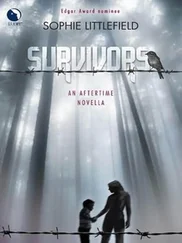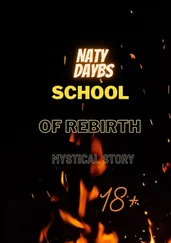Dor shrugged. “I’m handy. I’m sure I can learn.”
“Mmmm.” She gave him a long look before turning her attention to Cass. “You, on the other hand, will be spending lots of time in the Tapp Clinic.”
Cass kept her expression neutral. “Whatever I can do to help.”
“That’s what we like to hear.” Mary’s smile widened. “Tell you what. How about you and I take a quick trip over there right now-just us girls. We can leave Ruthie here with her daddy, get you back in time for dinner. I’d love to show you around the facility myself-I hope you’ll forgive me a little bragging, but I’m just so darn proud of what we’ve accomplished so far.”
“We’ve already seen some of it, when we had the blood test yesterday.”
“Oh.” Was it Cass’s imagination, or did Mary’s smile slip a little? “Okay. Yes. The blood test. It’s too bad that…” She sighed, and for a second she looked petulant, like a spoiled child denied an audience. “They didn’t show you the operating arena yet, did they? The patient rooms?”
“Uh…no…”
“Good! Because I want to show you those myself.” Mary’s good humor was instantly restored. “It was my idea, you know, using that building for the clinic. I modeled it after some of the World War I hospitals. It was really amazing, you’d have soldiers laid out in hotel lobbies and-oh, but we can talk about it on the way.”
“Sure…great.”
Cass avoided Mary’s eyes. She was picking up on things she didn’t like, things that set off her internal alarms. Cass, who had learned to read her mother’s expressions and her stepfather’s moods as a survival skill, who had listened to a hundred tortured souls baring their deepest secrets in church basements, was far more sensitive than most people to the subtleties of human exchanges. She was picking up something disturbing about Mary, a need for attention bordering on narcissism, a near-manic changeability of her energy. Occasionally, there was someone like this in a meeting, though they never lasted long. Their need for attention was never sated in the anonymous gatherings, which focused on the steps rather than the individuals.
She gave Ruthie a quick kiss and-since Mary was watching-kissed Dor, as well. Her lips brushed his cheek, warm and rough with stubble. The kiss caught him off guard; she had already moved away from him when he caught her arm and pulled her back.
For a moment she thought he was going to chastise her, question her-but instead he kissed her again, a real kiss, his mouth hot on hers, claiming her, tasting her. Before she could think she was kissing him back, a rush of sensation and need that ended too quickly when he broke from her and murmured against her ear. “Be careful,” he whispered, and then he released her.
Cass put her hand to her mouth, breathless. It had been a physical response-nothing more; synapses conditioned to fire in response to stimuli, and yet as they left the room Cass couldn’t help turning to watch the man she barely knew cradling her daughter and staring at her with an expression as indecipherable as it was intense.
THIS TIME, THERE WAS NO ONE LYING ON THE table in the operating room. There was no one there at all, except for a young ponytailed man who was setting out instruments in neat rows on a table.
“We use kaysev-based alcohol to sterilize our instruments,” Mary said conversationally. Any traces of her earlier moodiness, of the manic scrutiny, had disappeared when they began the tour. Mary pointed out each feature of the clinic as though she alone had been responsible for creating it. “And we use it as an antiseptic, too. It’s remarkably effective. We have a whole team looking into new ways of preparing and using kaysev. They’re working next door-know what I named that building?”
“Um, no…”
“The Carver Lab, after George Washington Carver. You know, the peanut guy? He invented more than a hundred different products-all from peanuts.”
“Really?” Cass remembered Carver from a grade school song they’d had to sing about him, but she feigned ignorance. Mary craved recognition, and letting her be the expert seemed like it couldn’t hurt. “Like what?”
“Well, a lot of food products of course, and cosmetics and medicinal applications. But what you don’t hear much about is that he was able to use peanuts to manufacture gasoline and explosives.”
“Gas from peanuts?”
“Sure. Just like any other plant-based ethanol-like kaysev ethanol, if you want a good example. Winter’s set us back, but I’m confident we’ll be manufacturing clean-burning ethanol by summer. But anyway, if you look at the way history’s been depicted in our country, there’s this relentlessly pacifist bent to it that isn’t helpful. I mean, peanut butter’s great for cheap nutrition and all-in a way it’s kind of a parallel for kaysev, I guess-but real societal change doesn’t come without firepower, without fuel and weapons and engagement. And casualties. Lots of casualties.”
Cass focused on keeping her expression neutral while the woman talked about her theory of progress. All the while, it was becoming increasingly clear to her that Mary was dangerously out of touch, maybe even crazy, speaking as casually of rebellion and violence as if she was discussing her grocery list. How had such a woman become a leader of the Rebuilders? How did she command their loyalty?
They had reached the end of a tour of the second-floor operating rooms, and though they had run into half a dozen staff and one groggy-looking patient being treated for a broken arm, Cass had seen no recovery rooms, no evidence of the ill or injured. The casualties she was talking about could well include the survivors of the attack on the library-including Sammi, if she’d been injured.
“What’s on the third floor? I mean, you were saying they’re doing the vaccine research here. Is that upstairs?”
Mary’s expression shifted, a hint of darkness settling around her eyes. “We’re just using it for storage at the moment. We’ll be expanding to fill up everything around here soon. But there’s something else I’d like to show you now.”
She led the way down the stairs, past the first floor, down to the cement-slab basement. In the stairwell there were no openings to let in natural light, and a single bulb, inadequate for the job, lit the space just enough to prevent them from stumbling. There was a smell here, something earthy and unpleasant and hard to place. The paint was stained and peeling, and someone had used a marker on the wall to sketch grossly exaggerated anatomical rendering of genitalia with an indecipherable caption.
“You know, Cass, that I am very hopeful about the role you can play here in Colima,” Mary said, ignoring both the images and the smell. “But Evangeline has some…concerns, I suppose you might say, that I would like to put to rest. She has nothing to do with research, but I have found that it’s best to address this sort of thing quickly. And decisively. You know, without a lot of fussing around and double-talking. What do you think of Evangeline, by the way?”
“I-uh, well, I don’t really know her,” Cass hedged. Was Mary questioning one of her top lieutenants? Or was it possible that Evangeline wasn’t as powerful as she wanted people to think? “I met her at the library, and-”
“Evangeline tells me you were traveling with Edward Schaffer, whom I believe is also known as Smoke.”
The uneasiness Cass had been carrying throughout the day tightened in her stomach. “I mean, yes, I was traveling with him but we had just met that day, at the, uh, school where he was sheltering. He was just, he offered to escort me to the library and I was glad to have him along.”
Читать дальше
Конец ознакомительного отрывка
Купить книгу












